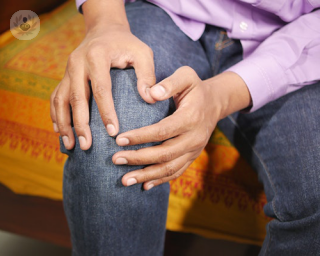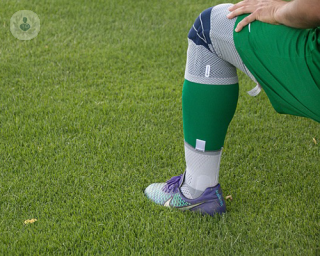Knee pain
Dr Martynas Juozaitis - Pain medicine
Created on: 09-12-2022
Updated on: 12-14-2023
Edited by: Sophie Kennedy
What are the most common causes of knee pain?
Pain felt in the knee is relatively common and is most often associated with ageing, injury or repeated stress on the joint. Although some sports, which involve rapid pivoting movements or jumping, can pose an elevated risk to the knee joint, it is also possible to sustain damage to the knee in daily activities such as walking, bending or standing.
Pain in the knee can also be a consequence of ageing, due to the ‘wear-and-tear’ on the joint across years of activity.
There are a number of injuries which can cause knee pain, including:
- Sprained or strained ligaments or muscles: Often caused by an injury or sudden twisting motion.
- Torn cartilage: Including the menisci (shock-absorbing connective tissues).
- Tendonitis: An inflammation of the knee’s tendons which can occur if they are overused in some repetitive activities.
- Dislocation of the kneecap: Where the patella moves out of its usual position, usually as a result of impact or a sudden twisting motion.
- Bursitis: An inflammation of some of the fluid-filled sacs which cushion the knee joint which may be caused by overuse, repetitive movements or injury.
Some medical conditions can also cause knee pain, such as:
- Rheumatoid arthritis: In which the joint becomes inflamed and the knee’s cartilage is damaged.
- Osteoarthritis: A degenerative wearing away of the knee’s cartilage.
- Gout: A type of arthritis which can cause sudden onset joint pain.
Being overweight also puts you at greater risk of suffering from knee problems and joint pain.
When should you see a doctor about knee pain?
If your knee is very painful, swollen or has changed shape or if you are unable to move or put weight on the joint, you should seek urgent medical advice. Additionally, a very high temperature, redness around the knee or feeling hot and shivery can be signs of infection and so it is important to seek out prompt medical attention.
If you have noticed a lack of instability or recurrent pain in your knee, even if there was no obvious injury to the joint, it’s important to see a doctor who can assess the cause of the problems.

How is the cause of knee pain established?
To diagnose the cause of knee pain, doctors may perform a number of tests and a physical examination as well as taking a medical history.
Some tests which can help to establish the cause of knee pain include:
- X-rays: Which can provide images of bones and internal tissues.
- CT or MRI scans: Which can offer a detailed picture of damage or disease in the muscles or ligaments.
- Arthroscopy: A minimally-invasive procedure where a camera can be inserted through a small incision to show damage, inflammation or degeneration of the joint.
Can knee pain cause complications?
If a knee problem requires treatment but is left untreated, this may lead to further complications and reduced mobility in the joint. An untreated problem in the knee could cause swelling and instability or cause it to lock, limiting physical activity.
It is important to seek out medical advice for any knee pain that is severe or does not show signs of improving after a few days of rest.
Can knee pain resolve itself or is treatment always required?
Knee pain can usually be treated at home and should improve after a few days of care and rest. If the pain is severe, debilitating or you see excessive swelling or redness in the joint, it’s important to seek out medical advice promptly.
How can you treat knee pain at home?
If you are experiencing knee pain, several steps can be taken at home to help to reduce any swelling or discomfort. It is important to avoid putting weight on the joint, so resting is advised and you should avoid standing for long periods of time.
Applying an ice pack to the area can also relieve swelling and you should take painkillers to help with any discomfort. Keeping the knee elevated and using a compression bandage may also be helpful.
Is walking or physical activity recommended for knee pain?
When living with a condition which causes knee pain such as osteoarthritis, keeping active can be difficult. Very gentle exercise, such as walking, can be of great benefit to the knees as it helps to rebuild cartilage, strengthens the muscles of the legs and it is useful when trying to maintain a healthy weight, which in turn reduces the pressure on the knee joint.
It’s important to listen to your body and not overexert yourself, however, as overuse of the joint and its tendons may aggravate any inflammation and cause more pain. You should stop if the pain becomes very severe or the knee feels very unstable.

How is knee pain treated?
If your knee pain is recurrent or does not improve after a few days’ rest, treatment may be required. Depending on the cause of your knee problem, a number of treatment options may be advised, including physiotherapy, assistive devices, such as shoe inserts, or surgery to repair torn ligaments.
In some cases, a partial or total knee replacement may also be appropriate. Regenerative medicine may also be suitable for some patients with recurrent joint pain problems.
How is recurrent knee pain treated or managed?
A number of lifestyle modifications may benefit patients suffering from long-term chronic knee pain, such as:
- Weight management
- Avoiding standing for long periods and ensuring that weight is always equally balanced between both legs
- Wearing cushioned and flat shoes
- Avoiding sleeping on your side, or when doing so place a pillow between the knees
- Gentle, low-impact exercise with a thorough warm-up
Additionally, a combination of physical therapy, injections and medication can help to manage recurrent knee pain. Regenerative medicine is also suitable for some patients with chronic joint pain.
What type of doctor treats knee pain?
Doctors who specialise in trauma and orthopaedics and regenerative or pain medicine treat knee pain, as well as physiotherapists.

















